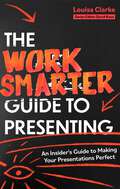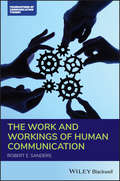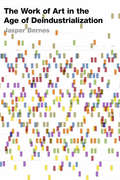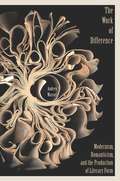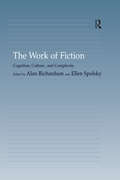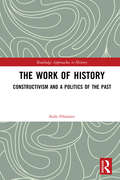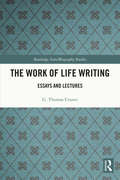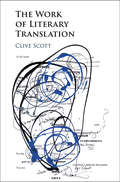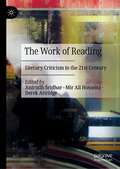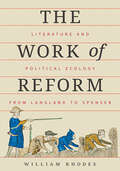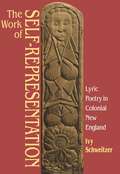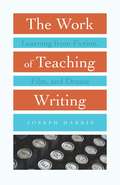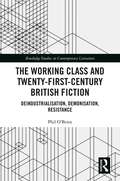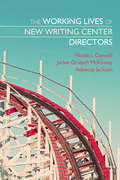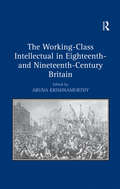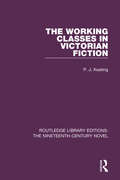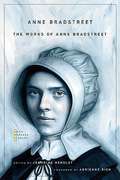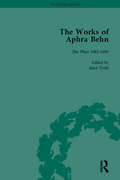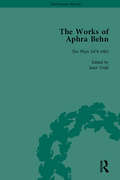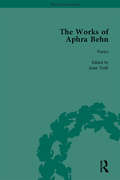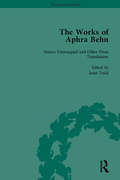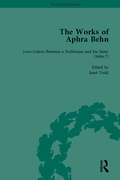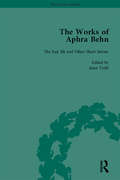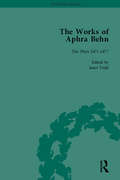- Table View
- List View
The Work Smarter Guide to Presenting: An Insider's Guide to Making Your Presentations Perfect (Work Smarter Series)
by Louisa ClarkeFact: most people would rather die than present in public. According to the National Institute of Mental Health, 75% of people rank fear of speaking in public as their number-one fear. In second place: death. For many people, presenting arouses fear of failure, of forgetting their content, of appearing nervous, of being ignored or judged by their audience, of encountering the unexpected, of technology, of going on too long or drying up. And too many presentations are lifeless, pointless and go on far too long. Yet the ability to stand up and give a presentation, a speech, a lesson or a toast in a way that captures your audience's attention and actually makes them think, feel or do something as a result is one of the most effective ways to stand out at work and in life. This book is a shortcut to making you shine on stage when you are under the spotlight or presenting on screen. It is a supremely practical guide to giving presentations that will take away the fear factor by providing the tips, techniques and tools to create and deliver presentations you'll enjoy giving and your audience will want to hear. Think of it as a friendly and experienced coach who can help you focus on the things that really make the difference in presenting so you can project the real you to the world in a way that feels comfortable and smart.The Work Smarter series:Our books provide shortcuts, tips and life-hacks for the development of essential business skills. The books bring together accomplished industry experts who have learned their trades at the coalface. They teach the skills ambitious businesspeople need in order to tip the playing field in their favour. It is the pirate equivalent of business advice; the antidote to conventional wisdom; 'smarter' practice over 'best practice'.
The Work Smarter Guide to Presenting: An Insider's Guide to Making Your Presentations Perfect (Work Smarter Series)
by Louisa ClarkeFact: most people would rather die than present in public. According to the National Institute of Mental Health, 75% of people rank fear of speaking in public as their number-one fear. In second place: death. For many people, presenting arouses fear of failure, of forgetting their content, of appearing nervous, of being ignored or judged by their audience, of encountering the unexpected, of technology, of going on too long or drying up. And too many presentations are lifeless, pointless and go on far too long. Yet the ability to stand up and give a presentation, a speech, a lesson or a toast in a way that captures your audience's attention and actually makes them think, feel or do something as a result is one of the most effective ways to stand out at work and in life. This book is a shortcut to making you shine on stage when you are under the spotlight or presenting on screen. It is a supremely practical guide to giving presentations that will take away the fear factor by providing the tips, techniques and tools to create and deliver presentations you'll enjoy giving and your audience will want to hear. Think of it as a friendly and experienced coach who can help you focus on the things that really make the difference in presenting so you can project the real you to the world in a way that feels comfortable and smart.The Work Smarter series:Our books provide shortcuts, tips and life-hacks for the development of essential business skills. The books bring together accomplished industry experts who have learned their trades at the coalface. They teach the skills ambitious businesspeople need in order to tip the playing field in their favour. It is the pirate equivalent of business advice; the antidote to conventional wisdom; 'smarter' practice over 'best practice'.
The Work and Workings of Human Communication (Foundations of Communication Theory Series)
by Robert E. SandersDiscover the fundamentals of human communication with this comprehensive and insightful resource Written in four sections, The Work and Workings of Human Communication identifies the underlying fundamentals that make our communication distinctively human. These fundamentals are the common ground that tie together the many topics and subject matters covered by the study and discipline of communication. They are also the basis of the unique contribution of the communication discipline to the social sciences. Professor, researcher and theorist Robert E. Sanders starts by focusing on what is unique about human communication and moves on to an examination of the complexities of scientific inquiry in the social sciences in general and in the communication discipline specifically. At the heart of the matter is the fact that humans are thinking beings who can make choices and therefore are not entirely predictable. This points towards new topics and questions that are likely to arise as the discipline evolves. Sanders’ approach leads to recognition of the fact that communication is at the center of how humans build our ways of life and participate together. By focusing on the underlying fundamentals that give rise to the discipline’s topics and subject areas, The Work and Workings of Human Communication encourages students to engage in independent thought about what they want to contribute by: Emphasizing the importance of communication in creating, sustaining or changing—and participating in—our ways of life on an interpersonal level and on a societal level Recognizing that human communication is inherently collaborative; people affect situations by interacting with others, not acting on others Explaining the history, current agendas and possible future of the social science side of the Communication discipline A perfect resource for new graduate students in introductory communication courses who have an interest in the social science side of the discipline, The Work and Workings of Human Communication is also highly valuable for undergraduate communication and liberal arts students who don’t possess a background in the discipline.
The Work of Art in the Age of Deindustrialization
by Jasper BernesA novel account of the relationship between postindustrial capitalism and postmodern culture, this book looks at American poetry and art of the last fifty years in light of the massive changes in people's working lives. Over the last few decades, we have seen the shift from an economy based on the production of goods to one based on the provision of services, the entry of large numbers of women into the workforce, and the emergence of new digital technologies that have transformed the way people work. The Work of Art in the Age of Deindustrialization argues that art and literature not only reflected the transformation of the workplace but anticipated and may have contributed to it as well, providing some of the terms through which resistance to labor was expressed. As firms continue to tout creativity and to reorganize in response to this resistance, they increasingly rely on models of labor that derive from values and ideas found in the experimental poetry and conceptual art of decades past.
The Work of Difference: Modernism, Romanticism, and the Production of Literary Form
by Audrey WasserThe Work of Difference addresses a fundamental ontological question: What is literature? And at the heart of this question, it argues, is the problem of the new. How is it that new works or new forms are possible within the rule-governed orders of history, language use, or the social? How are new works in turn recognizable to already-existing institutions? Tracing the relationship between literature and the problem of newness back to a set of concerns first articulated in early German romanticism, this book goes on to mount a critique of romantic tendencies in contemporary criticism in order, ultimately, to develop an original theory of literary production. Along the way, it offers new readings of major modernist novels by Samuel Beckett, Marcel Proust, and Gertrude Stein.
The Work of Fiction: Cognition, Culture, and Complexity
by Ellen SpolskyThe essays gathered here demonstrate and justify the excitement and promise of cognitive historicism, providing a lively introduction to this new and quickly growing area of literary studies. Written by eight leading critics whose work has done much to establish the new field, they display the significant results of a largely unprecedented combination of cultural and cognitive analysis. The authors explore both narrative and dramatic genres, uncovering the tensions among presumably universal cognitive processes, and the local contexts within which complex literary texts are produced. Alan Richardson's opening essay evaluates current approaches to the study of literature and cognition, locating them on the map of recent literary studies, indicating their most compelling developments to date, and suggesting the most promising future directions. The seven essays that follow provide innovative readings of topics ranging from Shakespeare (Othello, Macbeth, Cymbeline, The Rape of Lucrece) through Samuel Richardson's Clarissa, to contemporary authors Ian McEwan and Gilbert Sorrentino. They underscore some of the limitations of new historicist and post-structuralist approaches to literary cultural studies while affirming the value of supplementing rather than supplanting them with insights and methods drawn from cognitive and evolutionary theory. Together, they demonstrate the analytical power of considering these texts in the context of recent studies of cultural universals, 'theory of mind,' cognitive categorization and genre, and neural-materialist theories of language and consciousness. This groundbreaking collection holds appeal for a broad audience, including students and teachers of literary theory, literary history, cultural studies, and literature and science studies.
The Work of History: Constructivism and a Politics of the Past (Routledge Approaches to History #22)
by Kalle PihlainenSince the appearance of Hayden White’s seminal work Metahistory in 1973, constructivist thought has been a key force within theory of history and has at times even provided inspiration for historians more generally. Despite the radical theoretical shift marked by constructivism and elaborated in detail by its proponents, confusion regarding many of its practical and ethical consequences persists, however, and its position on truth and meaning is routinely misconstrued. To remedy this situation, The Work of History seeks to mediate between constructivist theory and history practitioners’ intuitions about the nature of their work, especially as these relate to the so-called fact–fiction debate and to the literary challenges involved in the production of historical accounts. In doing so, the book also offers much-needed insight into debates about our experiential relations with the past, the political use of history and the role of facts in the contestation of power.
The Work of Life Writing: Essays and Lectures (Routledge Auto/Biography Studies)
by G. Thomas CouserLife writing, in its various forms, does work that other forms of expression do not; it bears on the world in a way distinct from imaginative genres like fiction, drama, and poetry; it acts in and on history in significant ways. Memoirs of illness and disability often seek to depathologize the conditions that they recount. Memoirs of parents by their children extend or alter relations forged initially face to face in the home. At a time when memoir and other forms of life writing are being produced and consumed in unprecedented numbers, this book reminds readers that memoir is not mainly a "literary" genre or mere entertainment. Similarly, letters are not merely epiphenomena of our "real lives." Correspondence does not just serve to communicate; it enacts and sustains human relationships. Memoir matters, and there’s life in letters. All life writing arises of our daily lives and has distinctive impacts on them and the culture in which we live.
The Work of Literary Translation
by Clive ScottOffering an original reconceptualization of literary translation, Clive Scott argues against traditional approaches to the theory and practice of translation. Instead he suggests that translation should attend more to the phenomenology of reading, triggering creative textual thinking in the responsive reader rather than testing the hermeneutic skills of the professional translator. In this new guise, translation enlists the reader as an active participant in the constant re-fashioning of the text's structural, associative, intertextual and intersensory possibilities, so that our larger understanding of ecology, anthropology, comparative literature and aesthetics is fundamentally transformed and our sense of the expressive resources of language radically extended. Literary translation thus assumes an existential value which takes us beyond the text itself to how it situates us in the world, and what part it plays in the geography of human relationships.
The Work of Reading: Literary Criticism in the 21st Century
by Derek Attridge Anirudh Sridhar Mir Ali HosseiniThe Work of Reading: Literary Criticism in the 21st Century is a sustained critical examination of the developments in the field of literary studies from the early 2000s onwards within the context of the systematic problems in the humanities. This volume analyzes the origins of the current methods—including New Historicism, empiricism, New Formalism, postcritique, and others—and posits alternatives to the present state of literary studies. At a time when many aspects of current methods show a desire to adopt values from other disciplines to solve internal crises, this volume advocates a renewed focus on questions of form by means of the praxis of aesthetic study, close reading, and other modes of engaging directly with literary texts.
The Work of Reform: Literature and Political Ecology from Langland to Spenser
by William RhodesThe Work of Reform interweaves literary, economic, and environmental history to trace the influence that William Langland's harsh vision of enforced agrarian labor in Piers Plowman had on later medieval and early modern thinking about land and improvement in Britain and Ireland, culminating with Edmund Spenser's colonial writing. William Rhodes brings together a rich poetic archive with agrarian husbandry manuals, prose polemics, and imperial tracts to connect conflicts over land and labor on the English manor to those of Tudor Ireland, offering a new eco-Marxist literary history of ecological transformation across the medieval-modern divide. In the aftermath of the Black Death, the depopulation of the countryside, and the beginnings of the Enclosure Movement, English poets imagined enforced labor as a panacea for social unrest precipitated by environmental catastrophe. Arguing that Piers Plowman established how poetry could envision religious and economic transformation based on agrarian production, The Work of Reform reveals that the Piers Plowman tradition's valorization of agrarian toil was open to appropriation by later writers developing totalizing, top-down colonialist projects.
The Work of Self-Representation
by Ivy SchweitzerIn The Work of Self-Representation Ivy Schweitzer examines early American poetry through the critical lens of gender. Her concern is not the inclusion of female writers into the canon; rather, she analyzes how the metaphors of "woman" and "feminine" function in Puritan religious and literary discourse to represent both the "otherness" of spiritual experience and the ways in which race and class function to keep the "other" in marginalized positions.Schwetizer argues that gender was for seventeenth-century new England -- and still is today -- a basic and most politically charged metaphor for the differences that shape identity and determine cultural position. To glimpse the struggle between gender ideology and experience, Schweitzer provides close readings of the poetry of four New Englanders writing between the Great Migration and the first wave of the Great Awakening: John Fiske, Edward Taylor, Anne Bradstreet, and Roger Williams.Schweitzer focuses exclusively on lyric poetry, she says, because a first-person speaker wrestling with the intricacies of individual consciousness provides fruitful ground for exploring the politics of voice and identity and especially problems of authority, intertextuality, and positionality. Fiske and Taylor define the orthodox tradition, and Bradstreet and Williams in different ways challenge it. Her treatment of the familiar poetry of Bradstreet and Taylor is solidly grounded in historical and literary scholarship yet suggestive of the new insights gained from a gender analysis, while discussions of Fiske and Williams bring their little-known lyric work to light.Taken together, these poets' texts illustrate the cultural construction of a troubled masculinity and an idealized, effaced femininity implicit in the Puritan notion of redeemed subjectivity, and constitute a profoundly disturbing and resilient part of our Puritan legacy.
The Work of Teaching Writing: Learning from Fiction, Film, and Drama
by Joseph HarrisFilm and literature can illuminate the experience of teaching and learning writing in ways that academic books and articles often miss. In particular, popular books and movies about teaching reveal the crucial importance of taking students seriously as writers and intellectuals. In this book, Joseph Harris explores how the work of teaching writing has been depicted in novels, films, and plays to reveal what teachers can learn from studying not just theories of discourse, rhetoric, or pedagogy but also accounts of the lived experience of teaching writing. Each chapter examines a fictional representation of writing classes—Dead Poets Society, Up the Down Staircase, Educating Rita, Push, and more—and shifts the conversation from how these works portray teachers to how they dramatize the actual work of teaching. Harris considers scenes of instruction from different stages of the writing process and depictions of students and teachers at work together to highlight the everyday aspects of teaching writing. In the writing classroom the ideas of teachers come to life in the work of their students. The Work of Teaching Writing shows what fiction, film, and drama can convey about the moment of exchange between teacher and student as they work together to create new insights into writing. It will interest both high school and undergraduate English teachers, as well as graduate students and scholars in composition and rhetoric, literary studies, and film studies.
The Working Class and Twenty-First-Century British Fiction: Deindustrialisation, Demonisation, Resistance (Routledge Studies in Contemporary Literature)
by Phil O'BrienThe Working Class and Twenty-First-Century British Fiction looks at how the twenty-first-century British novel has explored contemporary working-class life. Studying the works of David Peace, Gordon Burn, Anthony Cartwright, Ross Raisin, Jenni Fagan, and Sunjeev Sahota, the book shows how they have mapped the shift from deindustrialisation through to stigmatization of individuals and communities who have experienced profound levels of destabilization and unemployment. O'Brien argues that these novels offer ways of understanding fundamental aspects of contemporary capitalism for the working class in modern Britain, including, class struggle, inequality, trauma, social abjection, racism, and stigmatization, exclusively looking at British working-class literature of the twenty-first century.
The Working Lives of New Writing Center Directors
by Rebecca Jackson Nicole Caswell Jackie Grutsch McKinneyThe first book-length empirical investigation of writing center directors’ labor, The Working Lives of New Writing Center Directors presents a longitudinal qualitative study of the individual professional lives of nine new directors. Inspired by Kinkead and Harris’s Writing Centers in Context (1993), the authors adopt a case study approach to examine the labor these directors performed and the varied motivations for their labor, as well as the labor they ignored, deferred, or sidelined temporarily, whether or not they wanted to. The study shows directors engaged in various types of labor—everyday, disciplinary, and emotional—and reveals that labor is never restricted to a list of job responsibilities, although those play a role. Instead, labor is motivated and shaped by complex and unique combinations of requirements, expectations, values, perceived strengths, interests and desires, identities, and knowledge. The cases collectively distill how different institutions define writing and appropriate resources to writing instruction and support, informing the ongoing wider cultural debates about skills (writing and otherwise), the preparation of educators, the renewal/tenuring of educators, and administrative “bloat” in academe. The nine new directors discuss more than just their labor; they address their motivations, their sense of self, and their own thoughts about the work they do, facets of writing center director labor that other types of research or scholarship have up to now left invisible. The Working Lives of New Writing Center Directors strikes a new path in scholarship on writing center administration and is essential reading for present and future writing center administrators and those who mentor them.
The Working-Class Intellectual in Eighteenth- and Nineteenth-Century Britain
by Aruna KrishnamurthyIn Britain, the period that stretches from the middle of the eighteenth century to the mid-nineteenth century marks the emergence of the working classes, alongside and in response to the development of the middle-class public sphere. This collection contributes to that scholarship by exploring the figure of the "working-class intellectual," who both assimilates the anti-authoritarian lexicon of the middle classes to create a new political and cultural identity, and revolutionizes it with the subversive energy of class hostility. Through considering a broad range of writings across key moments of working-class self-expression, the essays reevaluate a host of familiar writers such as Robert Burns, John Thelwall, Charles Dickens, Charles Kingsley, Ann Yearsley, and even Shakespeare, in terms of their role within a working-class constituency. The collection also breaks fresh ground in eighteenth- and nineteenth-century scholarship by shedding light on a number of unfamiliar and underrepresented figures, such as Alexander Somerville, Michael Faraday, and the singer Ned Corvan.
The Working-Classes in Victorian Fiction (Routledge Library Editions: The Nineteenth-Century Novel #22)
by P. J. KeatingFirst published in 1971. The book examines the presentation of the urban and industrial working classes in Victorian fiction. It considers the different types of working men and women who appear in fiction, the environments they are shown to inhabit, and the use of phonetics to indicate the sound of working class voices. Evidence is drawn from a wide range of major and minor fiction, and new light is cast on Dickens, Mrs Gaskell, Charles Kingsley, George Gissing, Rudyard Kipling and Arthur Morrison. This book would be of interest to students of literature, sociology and history.
The Works of Anne Bradstreet (John Harvard Library)
by Jeannine HensleyAnne Bradstreet was one of our earliest feminists and the first true poet in the American colonies. This collection of her extant poetry and prose, scrupulously edited by Jeannine Hensley, has long been the standard edition of Bradstreet’s work. Hensley’s introduction sketches the poet’s life, and Adrienne Rich’s foreword offers a sensitive critique of Bradstreet as a person and as a writer. The John Harvard Library edition includes a chronology of Bradstreet’s life and an updated bibliography.
The Works of Aphra Behn: The Plays, 1678-1682 (The Pickering Masters)
by Janet ToddAphra Behn (1640-1689) was one of the most successful dramatists of the Restoration theatre and a popular poet. This is the final volume in a set of seven which comprises a complete edition of all her works.
The Works of Aphra Behn: The Plays, 1678-1682 (The Pickering Masters)
by Janet ToddAphra Behn (1640-1689) was one of the most successful dramatists of the Restoration theatre and a popular poet. This is the sixth volume in a set of seven which comprises a complete edition of all her works.
The Works of Aphra Behn: The Plays, 1678-1682 (The Pickering Masters)
by Janet ToddAphra Behn (1640-1689) was one of the most successful dramatists of the Restoration theatre and a popular poet. This is the first volume in a set of seven which comprises a complete edition of all her works. This volume is a collection of her poetry.
The Works of Aphra Behn: The Plays, 1678-1682 (The Pickering Masters)
by Janet ToddAphra Behn (1640-1689) was one of the most successful dramatists of the Restoration theatre and a popular poet. This is the fourth volume in a set of seven which comprises a complete edition of all her works.
The Works of Aphra Behn: The Plays, 1678-1682 (The Pickering Masters)
by Janet ToddAphra Behn (1640-1689) was one of the most successful dramatists of the Restoration theatre and a popular poet. This is the second volume in a set of seven which comprises a complete edition of all her works.
The Works of Aphra Behn: The Plays, 1678-1682 (The Pickering Masters)
by Janet ToddAphra Behn (1640-1689) was one of the most successful dramatists of the Restoration theatre and a popular poet. This is the third volume in a set of seven which comprises a complete edition of all her works.
The Works of Aphra Behn: The Plays, 1678-1682 (The Pickering Masters)
by Janet ToddAphra Behn (1640-1689) was one of the most successful dramatists of the Restoration theatre and a popular poet. This is the fifth volume in a set of seven which comprises a complete edition of all her works.
